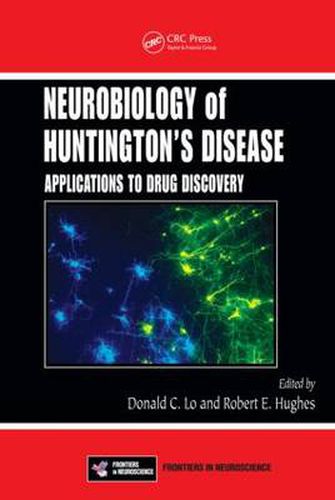Readings Newsletter
Become a Readings Member to make your shopping experience even easier.
Sign in or sign up for free!
You’re not far away from qualifying for FREE standard shipping within Australia
You’ve qualified for FREE standard shipping within Australia
The cart is loading…






In 1993, the genetic mutation responsible for Huntington’s disease (HD) was identified. Considered a milestone in human genomics, this discovery has led to nearly two decades of remarkable progress that has greatly increased our knowledge of HD, and documented an unexpectedly large and diverse range of biochemical and genetic perturbations that seem to result directly from the expression of the mutant huntingtin gene. Neurobiology of Huntington’s Disease: Applications to Drug Discovery presents a thorough review of the issues surrounding drug discovery and development for the treatment of this paradigmatic neurodegenerative disease. Drawing on the expertise of key researchers in the field, the book discusses the basic neurobiology of Huntington’s disease and how its monogenic nature confers enormous practical advantages for translational research, including the creation of robust experimental tools, models, and assays to facilitate discovery and validation of molecular targets and drug candidates for HD. Written to support future basic research as well as drug development efforts, this volume: Covers the latest research approaches in genetics, genomics, and proteomics, including high-throughput and high-content screening Highlights advances in the discovery and development of new drug therapies for neurodegenerative disorders Examines the practical realities of preclinical testing, clinical testing strategies, and, ultimately, clinical usage While the development of effective drug treatments for Huntington’s disease continues to be tremendously challenging, a highly interactive and cooperative community of researchers and clinical investigators now brings us to the threshold of potential breakthroughs in the quest for therapeutic agents. The impressive array of drug discovery resources outlined in the text holds much promise for treating this devastating disease, providing hope to long-suffering Huntington’s disease patients and their families.
$9.00 standard shipping within Australia
FREE standard shipping within Australia for orders over $100.00
Express & International shipping calculated at checkout
In 1993, the genetic mutation responsible for Huntington’s disease (HD) was identified. Considered a milestone in human genomics, this discovery has led to nearly two decades of remarkable progress that has greatly increased our knowledge of HD, and documented an unexpectedly large and diverse range of biochemical and genetic perturbations that seem to result directly from the expression of the mutant huntingtin gene. Neurobiology of Huntington’s Disease: Applications to Drug Discovery presents a thorough review of the issues surrounding drug discovery and development for the treatment of this paradigmatic neurodegenerative disease. Drawing on the expertise of key researchers in the field, the book discusses the basic neurobiology of Huntington’s disease and how its monogenic nature confers enormous practical advantages for translational research, including the creation of robust experimental tools, models, and assays to facilitate discovery and validation of molecular targets and drug candidates for HD. Written to support future basic research as well as drug development efforts, this volume: Covers the latest research approaches in genetics, genomics, and proteomics, including high-throughput and high-content screening Highlights advances in the discovery and development of new drug therapies for neurodegenerative disorders Examines the practical realities of preclinical testing, clinical testing strategies, and, ultimately, clinical usage While the development of effective drug treatments for Huntington’s disease continues to be tremendously challenging, a highly interactive and cooperative community of researchers and clinical investigators now brings us to the threshold of potential breakthroughs in the quest for therapeutic agents. The impressive array of drug discovery resources outlined in the text holds much promise for treating this devastating disease, providing hope to long-suffering Huntington’s disease patients and their families.